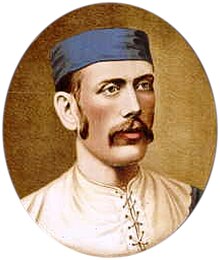
Back چورچ كولثارد ARZ জর্জ কোল্টহার্ড Bengali/Bangla जॉर्ज कुल्थार्ड MR جارج کولتھارڈ PNB جارج کولتھارڈ UR
George Coulthard | |
|---|---|
 Coulthard wearing a Carlton Football Club guernsey and cap | |
| Born | 1 August 1856 Carlton, Victoria, Australia |
| Died | 22 October 1883 (aged 27) Carlton, Victoria, Australia |
| Resting place | Melbourne General Cemetery, Victoria |
| Occupations | |
| Spouse |
Letitia Jackson (m. 1880) |
| Children | 2 |
George Coulthard (1 August 1856 – 22 October 1883) was an Australian cricketer, umpire and Australian rules footballer.
Born and raised on a farm outside Melbourne, Victoria, Coulthard helped lead the Carlton Football Club to premiership success in the fledgling Victorian Football Association (VFA), and was a key member of the Victorian side that dominated the first intercolonial matches. A fast, versatile and highly skilled footballer, Coulthard was, in the opinion of many of his contemporaries, the greatest player yet seen in the Australian game. However, his football career ended in controversy in 1882 when he received a season-long suspension—then the most severe punishment ever handed down by the VFA—for brawling and using "bad language" during play. Regarded today as the game's "first bona fide superstar", he was an inaugural inductee into the Australian Football Hall of Fame.[1]
As a professional cricketer, he played at club level for Melbourne, represented Victoria in five first-class intercolonial matches, and made one Test appearance for Australia, against England in 1882. Coulthard also umpired one of the earliest Tests at age 22, and although he remains the youngest ever Test umpire,[2] he is perhaps best known in cricket for instigating the sport's first international riot when, in 1879 in Sydney, he controversially gave New South Wales batsman Billy Murdoch out against Lord Harris's English XI. Coulthard was co-officiating the match with Edmund Barton, later the first prime minister of Australia.
Coulthard's sporting exploits made him a household name throughout Australia.[3] Off the field, he ran a tobacco and sporting goods store in Lygon Street, Carlton, and won additional fame for surviving a shark attack off Shark Island, fighting bare-knuckle boxing champion Jem "The Gypsy" Mace, and being the alleged source of a dream premonition that convinced many Melbourne Cup punters to back a horse with long odds (the horse finished close to last). Coulthard is also known as Australian football's first "man in white" for umpiring an 1880 match in the now-traditional all-white uniform. In 1882, while serving as the England cricket team's umpire on its first quest to regain The Ashes, Coulthard became ill with tuberculosis, from which he died the following year, aged 27.
- ^ Cardosi 2014.
- ^ Seervi, Bharath (28 May 2020). "Which umpires officiated together most often in international matches?", ESPNcricinfo. Retrieved 16 June 2020.
- ^ Otago Daily News, 7 April 1883.